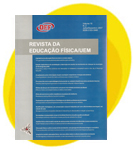<b>Excess post-exercise oxygen consumption: possible physiological mechanisms</b> - doi: 10.4025/reveducfis.v21i3.6283
Keywords:
Oxygen uptake, Energy metabolism, Body weight.
Abstract
The excess post-exercise oxygen consumption (EPOC) has been broadly investigated. Nevertheless, the physiological mechanisms responsible for the determination of magnitude and time course of EPOC are not totally explained. In this review, the main evidences regarding the physiological mechanisms which can determine the EPOC are discussed, as well as the effects of intensity and duration of exercise on the magnitude and length of EPOC. The fast EPOC seems to be a result of ATP-CP resynthesis, lactate removal, body temperature rise and lipidic metabolism rise. Most of these alterations have different kinetics from reported to EPOC. The slow EPOC seems to be a result of triglyceride/fatty acid cycle. The magnitude and length of EPOC can be linearly associated with the time and exponentially associated with the intensity. Due to this association, it is possible that magnitude and length of EPOC can impact on the body weight loss programs.Downloads
Download data is not yet available.
Metrics
Metrics Loading ...
Published
2010-09-05
How to Cite
1.
Lima-Silva AE, Pires FO, Bertuzzi R. <b>Excess post-exercise oxygen consumption: possible physiological mechanisms</b> - doi: 10.4025/reveducfis.v21i3.6283. JPhysEduc (Maringá) [Internet]. 2010Sep.5 [cited 2025Dec.21];21(3):563-75. Available from: https://periodicos.uem.br/ojs/index.php/RevEducFis/article/view/6283
Issue
Section
Review Articles
• Authors retain the copyright and full publishing rights without restrictions.

This work is licensed under a Creative Commons Attribution 4.0 International License.









_1502.jpg)











